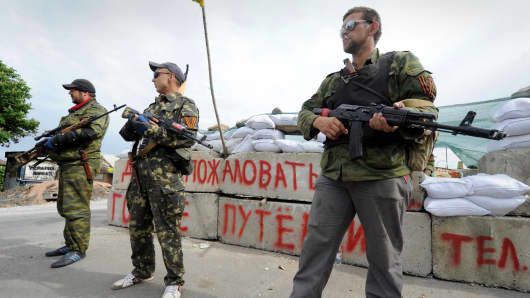While global strife, bloodshed and political infighting can be deeply unsettling, the sad reality is that they are hardly unusual. Indeed, epic power struggles are old as the human race.
The good news for investors is that markets for the most part have always been able to adjust and endure such events remarkably well, more often than not experiencing temporary gyrations but ultimately being very resilient in the face of troubling headlines.
Read MoreI call BS on Goldman's stock-market call: NYSE floor trader
Still, with events in Ukraine seemingly on the brink of spiraling out of control, the Middle East in a state of chaos once again and tensions between China and its neighbors seemingly growing with each passing day, some have become increasingly worried that the sum total of these events will eventually overwhelm the markets and take a big chunk out of their portfolios.
In part, this explains why some jittery investors have piled into the relative safety and security of bonds and bond funds in recent days.
Interestingly, this move could actually help the economy. The flight to bonds, along with accommodative Federal Reserve policies, will temper historically low interest rates even further. In this environment, deficits are more manageable, household debt levels decline, and consumer and businesses spending more — all of which provides extra fuel to the uneven economic recovery.
Read More'This bull market has more legs': pro
So in essence, with the economy recovering at an uneven pace and possibly in need of additional support before it can operate at full capacity again, geopolitical unrest is offering a helping hand. It's perverse to think about, but it could be true.
Whatever the case, it's clear that the alternative — a spike in rates — would be nearly catastrophic. Proof? Look no further than the housing market.
After a strong 2013, sales have lagged and housing starts are down. And while this is partly due to a brutally cold winter that in many parts of the country tamped down home construction projects and slowed activity, it's becoming clear that housing will not be able to provide the economic boost that many observers were predicting — and hoping for — at the beginning of the year.
Read MoreUS is the new Switzerland: Insana
A rise in interest rates would stall housing's momentum even more, further freezing out first-time homebuyers, who in good times are crucial drivers of economic activity, and leading to a decline in home-equity loan activity. That would have broad implications for multiple economic sectors and no doubt slow consumer spending on durable goods, such as cars, large appliances and furniture — often considered a good barometer of the health of the overall economy.
Meanwhile, the tenuous job gains of the past year could be lost and wage growth could continue to lag.
This is what investors should be worried about. More than fighting between pro-Russia rebels and Ukrainian military. More than Israel's incursion into Gaza. More than the ongoing civil war in Syria. More than the uptick in violence in Iraq. And more than China's increasingly aggressive posture toward its neighbors.
Read MoreWhy traders are wrong about the Fed: Insana
On a human level, these events are troubling. But for investors, the reality, while uncomfortable, is that low rates are the gas that is fueling our economic engine, and a series of disquieting world events are making it flow more freely.
Commentary by Ross Gerber, the CEO and president of Santa Monica, Calif-based Gerber Kawasaki (www.gerberkawasaki.com), an independent investment advisory and wealth management firm with approximately $260 million in assets under advisement.
Disclosure: Gerber Kawasaki clients and employees may own positions in various companies or assets mentioned in the article, but this is not intended as financial advice to buy or sell anything. Investors are advised to do their own research and/or consult their financial advisor.


